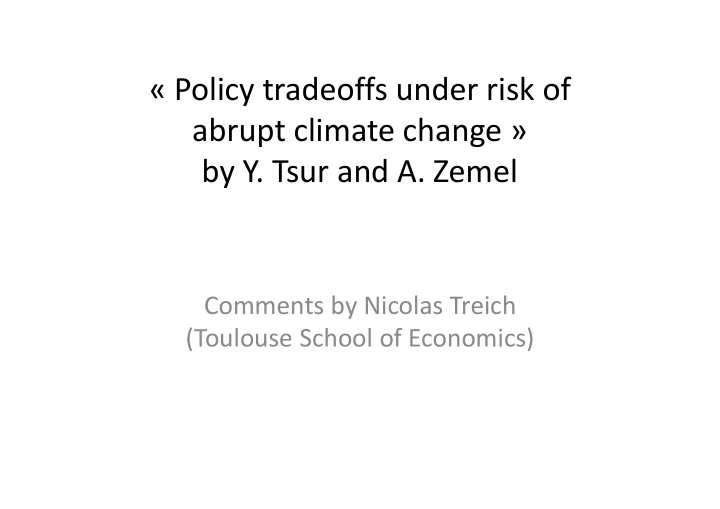

« Policy tradeoffs under risk of abrupt climate change » by Y. Tsur and A. Zemel Comments by Nicolas Treich (Toulouse School of Economics)
Source: Rheinberger and Treich (2015) 2
The contribution (as I see it) • The paper: – Examines the tradeoff between mitigation and adaptation in a dynamic stochastic model – Uses more general functional forms than in previous literature (in particular Zemel 2015) • My assessment: – The paper is well written, and the theoretical analysis well conducted – The contribution is welcome because assumptions about functional forms drive the mitigation ‐ adaption tradeoff – The paper could yet be more general regarding assumptions about functional forms
Functional forms • A general « well ‐ behaved » instantaneous utility: u(m,a) – m: emissions – a: adaptation – Zemel (2015) assumes u aa =u am = 0 – Yet, a separable utility u(m,a)=m ‐ m 2 /2 ‐ a 1 ‐ µ is used in the example • A damage function ϕ separable from the utility function – Implies for instance that (marginal) benefit of abatement is independent from initial wealth/capital
Insurance economics • Model: – U= (1 ‐ h(m)) u(m ‐ k) + h(m) u(m – k – ϕ (k)) – k drives « self ‐ insurance » and m drives « self ‐ protection » motives – Remark: risk aversion (i.e., concavity of u) is enough to induce nonseparability – The insurance economics literature has studied the self ‐ protection and self ‐ insurance tradeoff – Key references: Ehrlich and Becker (JPE 1972), Jullien ‐ Salanié ‐ Salanié (GRIR 1999)
Recommend
More recommend